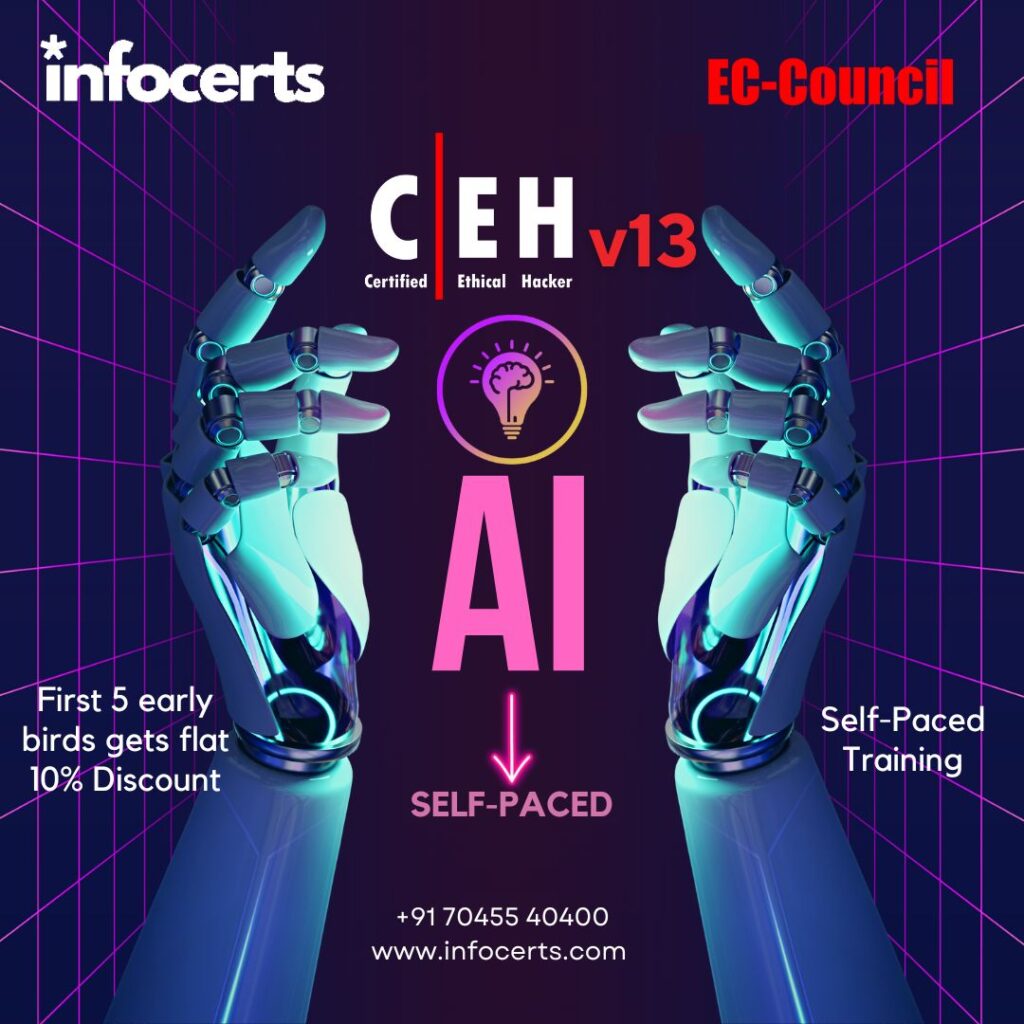ISO/IEC 42001:2023 Information technology Artificial intelligence Management system
Infocerts LLP
ISO/IEC 42001 is an international standard that specifies requirements for establishing, implementing, maintaining, and continually improving an Artificial Intelligence Management System (AIMS) within organizations. It is designed for entities providing or utilizing AI-based products or services, ensuring responsible development and use of AI systems.
ISO/IEC 42001 is the world’s first AI management system standard

Jobs related to CompTIA
ISO/IEC 42001:2023 Lead Implementer Objectives
LEAD IMPLEMENTER TRAINING PROGRAM ON ARTIFICIAL INTELLIGENCE MANAGEMENT SYSTEM (AIMS) BASED ON ISO/IEC 42001:2023
- Introduction to Artificial Intelligence (AI)
- Introduction to Machine Learning (ML)
- The concept of data science
- AI concepts and terminologies
- Generative AI
- Discriminative AI
- Understand how AI becomes disruptive
- AI considerations
- Regulatory stipulations
- Transparency needs
- Introduction to ISO/IEC 42001:2023 standard Applicability of the standard
- Relationship between Information Security, Data Privacy and AI
- Benefits
- Responsible use of AI
- Efficiency factors
- Riskbased approach
- Traceability, transparency, and reliability
- Clauses and requirements
- ISO/IEC 22989:2022 standard – key terms explanation
- ISO/IEC 23053:2022 standard
- Framework for Artificial Intelligence (AI) Systems Using Machine Learning (ML)
- ISO/IEC 23894:2023 standard
- Artificial intelligence Guidance on risk management
- ISO/IEC 42001:2023 Implementation steps
- Case studies and exercises
Duration
16hrs Live Online Training
ARTIFICIAL INTELLIGENCE PROFESSIONAL BASED ON ISO42201:2023
- Introduction to AI and ML
- Basics of AI and ML
- Examples of AI in daily life and business
- Impact on industries
- Need for Systematic AI Approach
- Importance of structured management systems
- Overview of ISO/IEC 42001:2023
- Aligning AI with organizational goals
- Key Considerations for AI in Business
- Managing elements in AI integration
- Data quality, bias, and ethical issues
- Ensuring transparency and risk management
- Practitioner’s Perspective
- Role of AI practitioners
- Daily management challenges and solutions
- Monitoring performance and risk communication
- Case Studies and Insights
- Realworld AI implementation examples
- Lessons learned and group discussions
- Q&A and Course Wrapup
- Participant questions
- Key takeaways and next steps for learning
Duration
6hrs Live Online Training
INFOMATION SECURITY AWARENSS WITH AI
- Introduction to Information Security and AI
- Key concepts in information security
- AI applications in cybersecurity
- AI’ s role in combating security threats
- Common AI-Driven Security Threats
- AI-powered attacks (e.g., phishing, malware, deepfakes)
- Real-world AI-related incidents
- Exploitation of AI by attackers
- Using AI for Threat Detection and Response
- AI tools for threat identification and response
- Machine learning basics for anomaly detection
- Automating incident response with AI
- Information Security Best Practices with AI
- Data protection enhancement through AI
- Employee roles in securing AI systems
- Monitoring AI models for bias and security risks
- Case Studies and Interactive Discussion
- Realworld examples of successful AI applications in information security
- Group discussion on potential AIrelated security scenarios
- Q&A and WrapUp
- Participant questions and answers
- Key takeaways and recommendations for further learning
Duration
2hrs Live Online Training
Professionals responsible for overseeing and managing AI projects.
EXAM CODE | ITC-096 |
LAUNCH DATE | February 10, 2024 |
EXAM DESCRIPTION | The Artificial Intelligence Management System (ISO/IEC 42001) Foundation exam tests the candidate knowledge of the ISO/IEC 42001:2023. |
CURRENT VERSION | v1 (February 10, 2024) |
EXAM FORMAT | Multiple choice; computer-based; closed book (online proctored exam) |
NUMBER OF QUESTIONS | 40 questions |
PASSING SCORE | 70% (28 out of 40) |
EXAM DURATION | 60 minutes |
LEVEL | Foundation |
LANGUAGES | English |
EXAM DESCRIPTION | This exam includes topics such as Scope of the ISO/IEC 42001, Normative references, Terms and Definitions, Context of the organization (Understanding the organization and its context, Understanding the needs and expectations of interested parties, Determining the scope of the AI management system, and AI management system), Leadership (Leadership and commitment, AI policy, Roles, responsibilities, and authorities), Planning (Actions to address risks and opportunities, AI risk assessment, AI risk treatment, AI system impact assessment, AI objectives and planning to achieve them, Planning of changes), Support (Resources, Competence, Awareness, Communication, and Documented information), Operation (Operational planning and control, AI risk assessment, AI risk treatment, and AI system impact assessment), Performance evaluation (Monitoring, measurement, analysis and evaluation, Internal audit, and Management review), Improvement (Continual improvement and Nonconformity and corrective action), and Annex A (normative) Reference control objectives and controls. |
RECOMMENDED HOURS OF STUDY | 16 hours |
BLOOM’S TAXONOMY | Level 1 (Remembering), Level 2 (Understanding) and Level 3 (Applying) |
RECOMMENDED READING | • ISO/IEC 42001:2023 – Information technology – Artificial Intelligence Management System |
PREREQUISITES | There are no prerequisites for this certification |
RECOMMENDED EXPERIENCE | Six months of work experience in Artificial Intelligence |
VALIDITY PERIOD | Lifetime |
ISO 42001 covers issues throughout the AI system lifecycle, from the initial concept phase to the final deployment and operation of the system. It is designed to help organizations manage the risks associated with AI and ensure that their AI systems are developed and used responsibly.
How can we help?
Sample Certificate
Latest Blog Post
India’s Data Protection Bill: Impact on Mumbai Businesses
Introduction The India Data Protection Bill is a significant step...
Read MoreISO27001 Lead Auditor: Enhancing Cybersecurity in Visakhapatnam’s Shipbuilding Industry
Introduction Visakhapatnam, home to India’s strategic shipbuilding industry, plays a...
Read More

